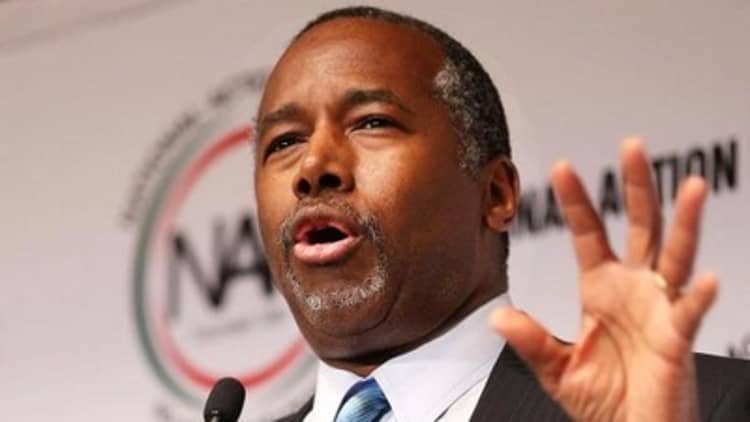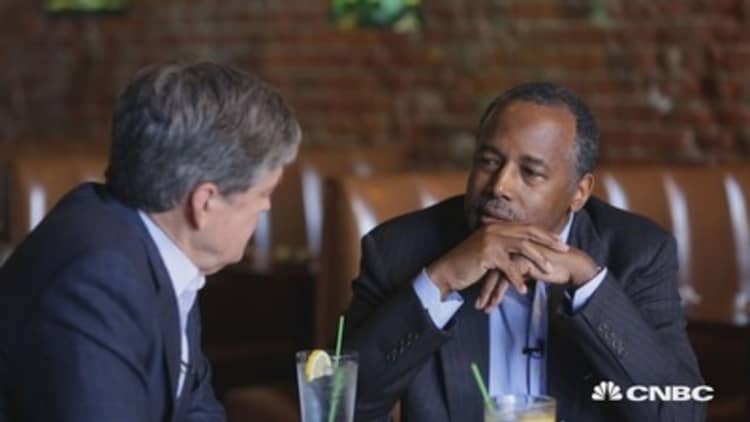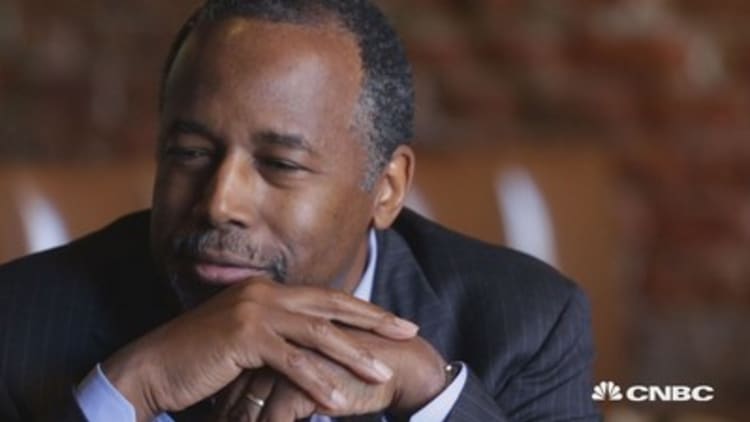



Dr. Ben Carson, the most unorthodox candidate in the 2016 Republican presidential field, said he doesn't aspire to be a politician. And he's not kidding.
He proposes, for example, to replace more than just Obamacare with his plan for health savings accounts. He also wants his plan to replace all health insurance except for catastrophic coverage. He even wants it to replace Medicare—the extraordinarily popular health program for the elderly.
"When people are able to see how much more freedom they will have, and how much more flexibility they will have, and how much more choice they would have," he explained in our interview, "I think it's going to be a no-brainer."
Politicians—like his rivals for the Republican nomination—don't say things like that. The question surrounding his candidacy is whether the party's discontent with politics as usual is great enough to allow his campaign to endure.
If so, electoral competition will become the second professional mountain the African-American doctor has climbed. From his poverty-stricken upbringing by a single mother in Detroit, he thrived in high school, at Yale, and the University of Michigan medical school. As director of pediatric neurosurgery at Johns Hopkins University Medical Center in Detroit, he led the first successful separation of Siamese twins joined at the back of the head.
Read MoreHarry Reid: Stepping down, yes. Retiring? Never
After years of growing celebrity through medicine, Carson burst into the political world with a stinging rebuke of President Barack Obama's policies at the 2013 National Prayer breakfast, as Obama watched a few feet away. The Wall Street Journal swiftly published an editorial headlined, "Ben Carson for President."
His initial moves onto the campaign steps have been trailed by controversy over impolitic remarks on homosexuality, gay marriage, the IRS and President Obama. A persistent critic of "political correctness," he has been stung by reactions he has elicited even from conservative news outlets. He complained, for instance, that conservative radio host Hugh Hewitt "was so gleeful thinking that he had caught me" as under-informed about the North Atlantic Treaty Organization.
Lately, Carson said he has chosen his words more carefully. "I have come to understand that if you say something that keeps people from being able to hear your actual message, then there's no point in saying it."
But he'll only compensate so far. "We think the only people who can handle the kinds of decisions that need to be made...are people who are steeped in politics," he explained. "When I go back and look at the Constitution and I look at the writings of the people who put all this together, they never thought there should be this political class or this political pedigree that was necessary. I think what they felt was necessary was wisdom and a love for our Constitution and a love for our country and common sense."
Read MoreSen. Ted Cruz blames the media for distorting his image
He harks back to the founders—he cites Franklin and Jefferson as particular inspirations—for his vision of how he hopes to change the country. He wants a more "people-centric" America rather than the "government-centric" one he perceives today, in which government "tells the people to jump and the people say 'How high?'"
He prescribes tax cuts and increased self-reliance to revive the economy and put more Americans on a path of independence and prosperity.Drawing on his experiences from the poor neighborhoods of Detroit to the most advanced 21st century hospitals, he insists that even the hope-starved participants in recent Baltimore don't need government to improve their lives.
"In several states you can get as much or more on government assistance as you can by working a minimum wage job," he explained. "I don't necessarily blame people for saying, 'Look, I can stay home and make this money, or I can go and work this little chicken job that doesn't have many benefits.
"Recognize that if you go and take that chicken job, you gain skills, relationships, the possibility of moving up the ladder. So a year or two or five down the road, you're no longer in that position. This is what people have forgotten."
He doesn't eschew all government action—or disagree with Obama on everything. He said government shouldn't cut welfare benefits until tax cuts and other steps have improved economic opportunity. He wants government to use tax breaks to "incentivize" businesses to provide child care facilities for inner-city single mothers. He said the minimum wage "probably" should be raised, and that the Iraq War launched by President George W. Bush was unnecessary.
Read MoreGov. Jindal: 'Maybe I'm not what they think a conservative should look like'
Carson faces huge challenges from a Republican field jammed with rivals who have electoral experience and stronger ties to major donors in the business community. But he starts with a foothold of popular support.
In this week's NBC News/Wall Street Journal poll, Carson holds down sixth place with 7 percent of the national Republican primary electorate. That places him behind Jeb Bush, Marco Rubio Scott Walker, Rand Paul and Ted Cruz. But he leads Chris Christie, Mike Huckabee, Rick Perry and Carly Fiorina.
"It should be fun," he said over a salad on the day before his official announcement. "Eye-opening for a lot of people."


